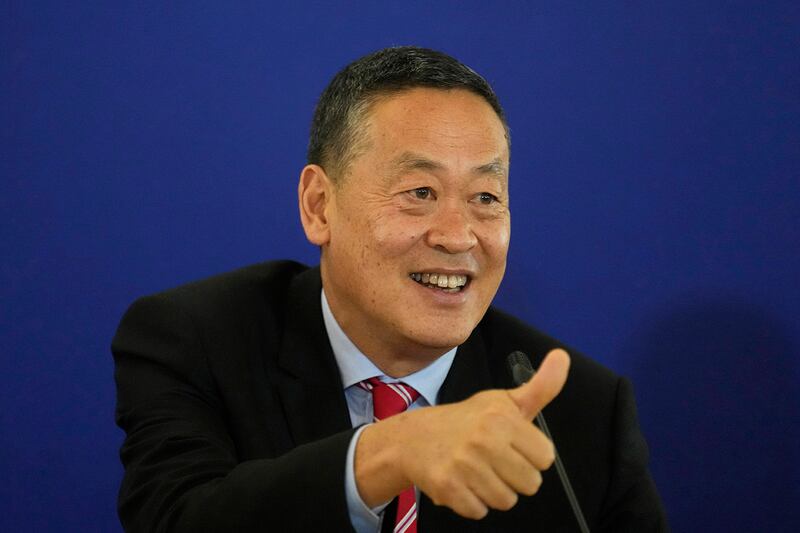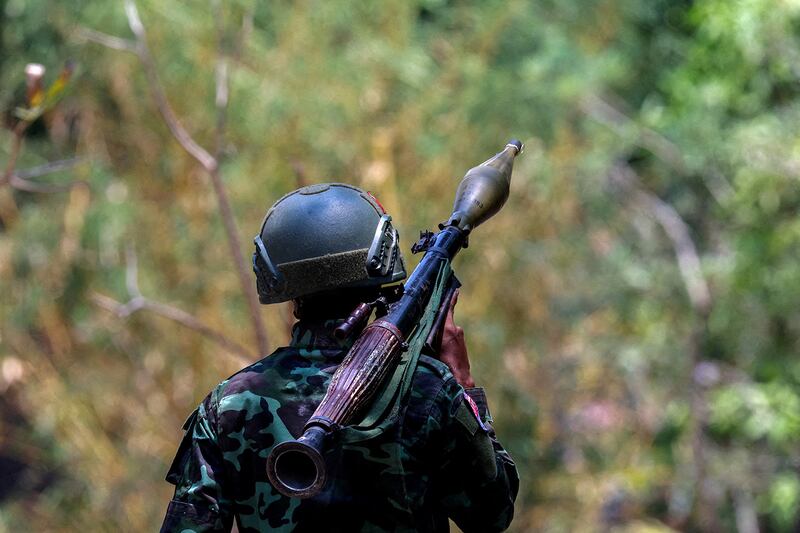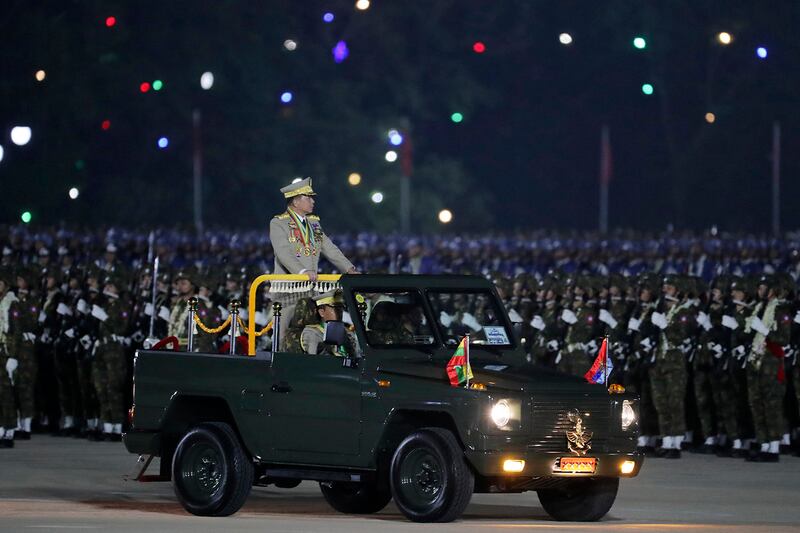Thailand’s Foreign Minister Parnpree Bahiddha-Nukara has reiterated his country’s offer to mediate between military junta forces and rebel groups to “restore peace quickly” in Myanmar.
The latest call from Bangkok for negotiations comes as ethnic armies and other anti-junta forces are gaining the upper hand in the three-year-old conflict, which has edged close to the Thai-Myanmar border, sending refugees across into Thailand.
Speaking this week from Mae Sot, a Thai district that sits on the border with Myanmar’s Kayin state, Parnpree revealed that initial discussions had already taken place with various military and ethnic groups in Myanmar. ASEAN would play a key role in talks, he said.
“They haven’t had the time to discuss with us yet, but they are aware that we are ready to act as a mediator and to comprehensively resolve Myanmar’s issues to restore peace quickly,” said the foreign minister, who also serves as a deputy prime minister.
Parpree’s appeal follows a call from Thai Prime Minister Srettha Thavisin for Myanmar’s warring parties to agree to a ceasefire.
"The current regime is starting to lose some strength," he said earlier this month, adding, "but even if they are losing, they have the power, they have the weapons. Maybe it's time to reach out and make a deal."

Another voice for negotiations from ASEAN is former Cambodian Prime Minister Hun Sen, who, as if to make his allegiances known from the outset, met with the Myanmar junta’s envoy in one of his first acts after returning to frontline politics as the acting head of state.
Hun Sen said he wants to speak with Min Aung Hlaing, the junta leader, "to engage in discussions and idea exchange aimed at resolving the crisis". Hun Sen failed to move Min Aung Hlaing in January 2022 when he visited Naypyidaw – the first foreign leader to do so since the coup – against the wishes of other ASEAN states.
The interventions of Hun Sen and Srettha imply disregarding the liberty of the Burmese people.
Hun Sen fancies himself as a geostrategist, a Lee Kwan Yew incarnate, but he has yet to distinguish himself in that role. But he also has a lot of time on his hands now that his son is prime minister.
War spillover fears
Srettha is, justifiably, fearful of the Myanmar civil war spilling over into Thailand, especially now as the anti-junta forces are capturing border towns in eastern Myanmar.
He has been unfairly burdened by his ASEAN colleagues with the task of sorting out the Myanmar crisis after three years of ineffectual efforts to push the junta to stop fighting its people and talk to its opponents.
Less justifiably, Srettha is overly concerned about declining trade with Myanmar and seems to be reveling in the international prestige he’s getting from the crisis. But he is still politically dependent on the Bangkok generals who only last year sought full re-engagement with the junta.
Perhaps some other of Myanmar’s neighbors are getting jittery about what happens if the anti-junta forces succeed. The people of Myanmar are on the cusp of a popular democratic revolution, one of the few in Southeast Asian history.
This cannot sit well with communists in Hanoi or Vientiane, nor with Cambodia’s family-run despotism – or with the generals in Bangkok.
Would Myanmar set off a “Southeast Asian Spring”? Probably not.
But other peoples sweltering under the heat of oppression would be able to look to their near neighbors who had thrown off tyranny by their own hands without any foreign support in the shadows of global attention.
Nonetheless, even hard-nosed opportunists like Hun Sen and the Thai generals advising Srettha must understand that a negotiated settlement that leaves the military with political power is not a path towards long-term stability in Myanmar.

A premature deal would fail to take Myanmar off the ASEAN agenda, the desire of everyone else in Southeast Asia.
Suppose, however, the junta were to agree to negotiations. What would it demand? Certainly that the Tatmadaw, the military, remains in its current state as the national military without any civilian meddling.
The generals would demand to keep their stranglehold over politics, including military-appointed seats in parliament. For the 2008 Constitution would remain in force. They’d oppose any tribunals against military officials over their atrocities. And they would probably want to prosecute the rebels it calls “terrorists”.
Propping up the junta
Would most of the anti-junta forces accept such terms? Almost certainly not. The National Unity Government (NUG) isn’t eager to enter a coalition with the generals.
The People’s Defence Forces and ethnic armed organizations (EAOs) would understand negotiations to be a capitulation of their federalist, democratic cause. Too much blood has been spilt for a truce.
Even if the junta accepted a much diminished political role, no one can trust it not to launch another coup in the future.
Maybe some of the EAOs might accept a negotiated deal, but that would be dependent on their regions gaining far more autonomy than the military has ever countenanced before – and which the military would try to roll back sometime in the future.

Some degree of violence would continue and the government that is created by a negotiated settlement would not control most of the country.
Anyone can call for peace and reach for the cliche that all wars end in negotiations, which isn’t actually true. Civil wars end unconditionally or they don’t end at all – the seven-decade ceasefire on the Korean Peninsula, for instance.
Hun Sen, when ending the Cambodian civil war in the 1990s, didn’t make peace with the Khmer Rouge; he hollowed it out through violence and defections. There was no “win-win” for those who remained his enemies.
Now that Myanmar’s anti-junta forces are on the march and the despots are in retreat, this is not the time for others to intervene and forestall the revolution.
If Southeast Asian leaders really wanted to hasten the end of the conflict, they would turn against the junta, not try to prop up its dying power through calls for ceasefires and negotiations.
David Hutt is a research fellow at the Central European Institute of Asian Studies (CEIAS) and the Southeast Asia Columnist at the Diplomat. He writes the Watching Europe In Southeast Asia newsletter. As a journalist, he has covered Southeast Asian politics since 2014. The views expressed here are his own and do not reflect the position of RFA.
